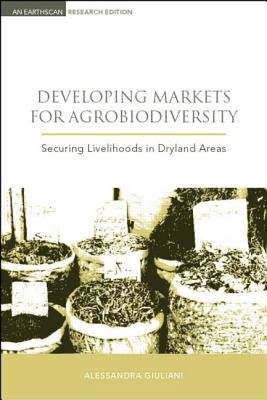
En raison d'une grêve chez bpost, votre commande pourrait être retardée. Vous avez besoin d’un livre rapidement ? Nos magasins vous accueillent à bras ouverts !
- Retrait gratuit dans votre magasin Club
- 7.000.000 titres dans notre catalogue
- Payer en toute sécurité
- Toujours un magasin près de chez vous
En raison de la grêve chez bpost, votre commande pourrait être retardée. Vous avez besoin d’un livre rapidement ? Nos magasins vous accueillent à bras ouverts !
- Retrait gratuit dans votre magasin Club
- 7.000.0000 titres dans notre catalogue
- Payer en toute sécurité
- Toujours un magasin près de chez vous
Developing Markets for Agrobiodiversity
Securing Livelihoods in Dryland Areas
Alessandra Giuliani, Bioversity International
244,45 €
+ 488 points
Format
Description
�This wonderful book demonstrates how rural livelihoods - as well as diets, health and ways of life - are enhanced by the so-called �neglected and underutilized plant species� which, in the book�s Syrian case study, include such deliciously interesting things as capers, laurel, jujube and figs. Using value chain analysis the author illuminates the opportunities for strengthening arid land economies with attention to such species, while simultaneously maintaining the diversity and integrity of those plant genomes, landscapes and cultures. And keeping the world worth tasting.� KEN WILSON, EXECUTIVE DIRECTOR OF THE CHRISTENSEN FUND �Alexandra Giuliani delivers a convincing and very practical account of how biodiversity products derived from neglected and underutilized plant species enter the markets in Syria. By highlighting the value of these plant products for the family income and health status of marginal farmer families in rural drylands and semi-arid areas, she brings the message home as to why it is so important to maintain biodiversity of the genetic resources not by protection alone, but rather through their judicious use.� KATHARINA JENNY, SENIOR ADVISOR, FEDERAL DEPARTMENT OF FOREIGN AFFAIRS, SWISS AGENCY FOR DEVELOPMENT AND COOPERATION Just four crops - maize, potatoes, rice and wheat - provide more than 90 per cent of the world�s food. Old varieties of even these crops are disappearing as farmers and consumers strive for more uniformity in food products. This in turn affects less obvious elements, such as insects that play a role in pollinating plants or controlling pests and the soil organisms that help plants extract nutrients from the soil. Also, farmers need a broad base of agrobiodiversity to be able to respond and adapt to environmental changes and to improve their production. This is especially important in the face of climate change and changing economic and political pressures. This book from Bioversity International describes a study conducted in Syria of how communities are developing markets for local products derived from neglected and underutilized plants. Based on concrete case studies, the data and processes documented in this book show the potential of biodiversity to make a significant contribution to livelihood security in communities that inhabit difficult environments with unique resources. The study also highlights the importance of local cultural knowledge and institutions in sustainable development of biodiversity markets. Published with Bioversity International.
Spécifications
Parties prenantes
- Auteur(s) :
- Editeur:
Contenu
- Nombre de pages :
- 144
- Langue:
- Anglais
- Collection :
Caractéristiques
- EAN:
- 9781844074686
- Date de parution :
- 27-07-07
- Format:
- Livre relié
- Format numérique:
- Genaaid
- Dimensions :
- 163 mm x 236 mm
- Poids :
- 344 g

Les avis
Nous publions uniquement les avis qui respectent les conditions requises. Consultez nos conditions pour les avis.






